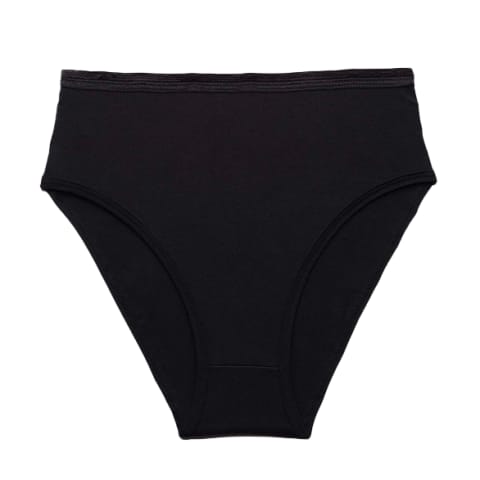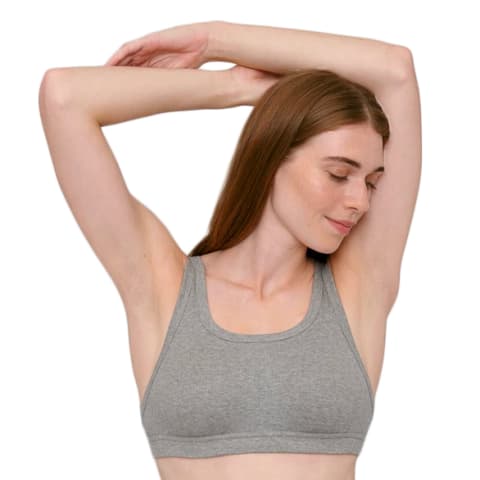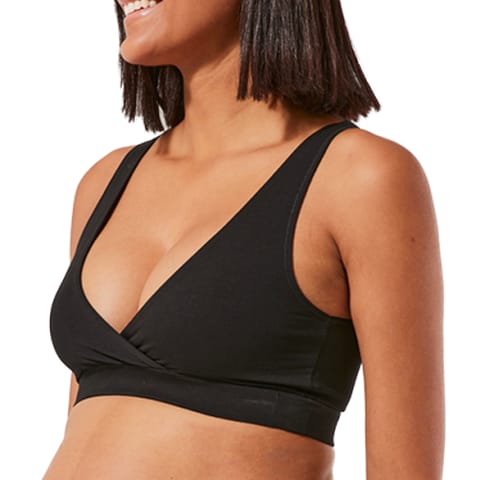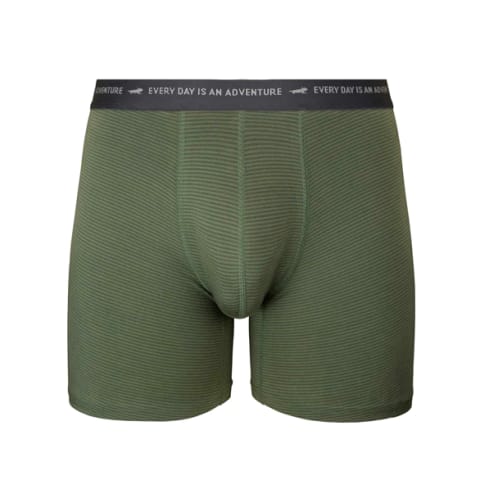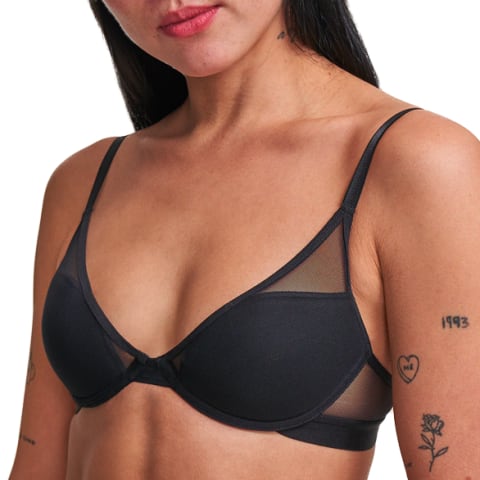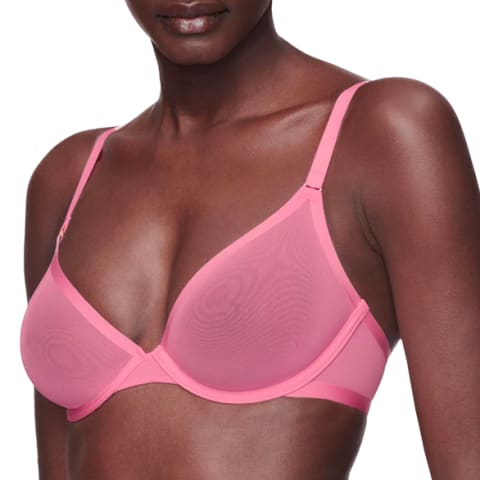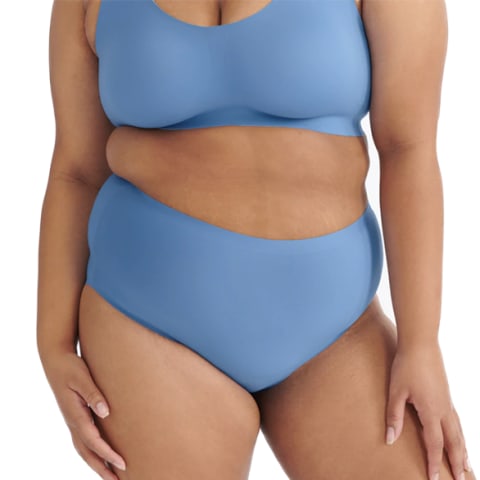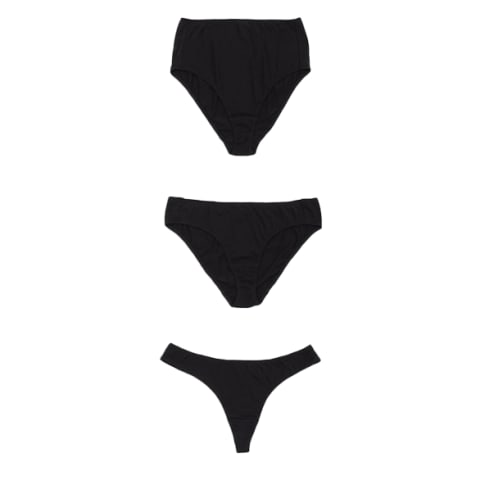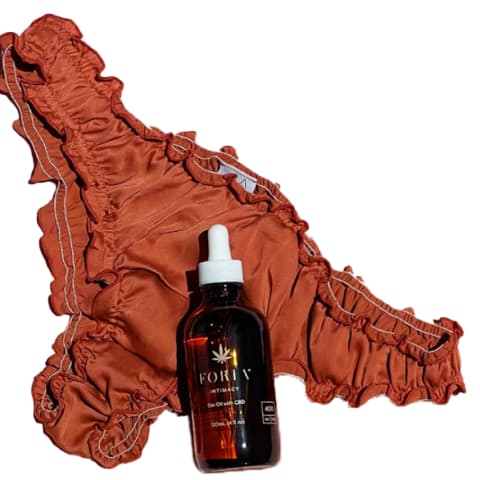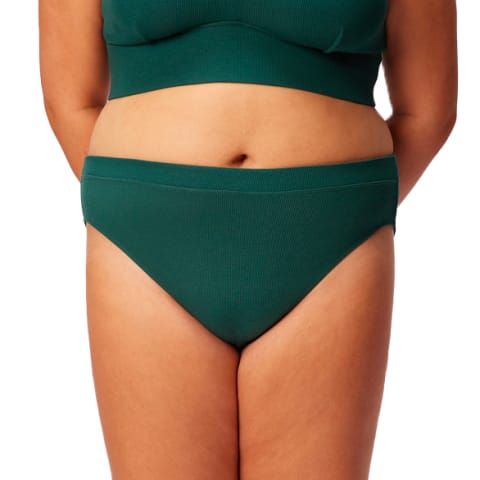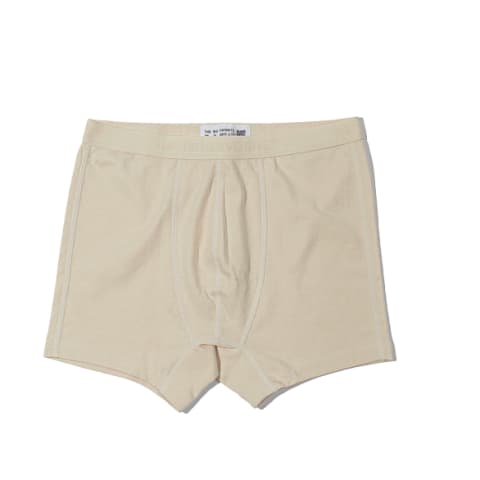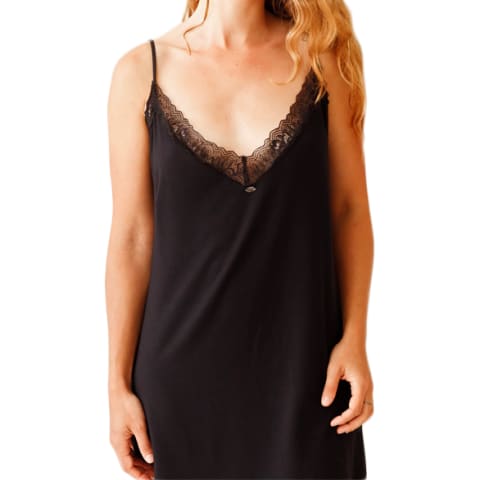How To Shop For Ethical, Sustainable Underwear + 12 Top Brands

Underwear is probably not the first thing that comes to mind when you think about sustainable swaps. But like anything else in your closet, your undies have an environmental impact of their own! Here are a few ways to shop for underwear that's a bit easier on the planet, and 12 ethical brands to trust with your intimates.
What it means for underwear to be ethical & sustainable.
Sustainable underwear is typically made with a "slow fashion" mentality—meaning it's thoughtfully created to have a low environmental impact along all parts of its life cycle:
- Starting with materials, undergarments made from natural materials like cotton or hemp tend to be more sustainable than those made from petroleum-derived synthetics like polyester or nylon. Sustainable stylist Cassandra Dittmer adds that natural materials tend to be more breathable and less likely to cause irritation—especially important when you're choosing what to wear down there.
- Moving on to production, ethical undies are made in factories that take care of employees (physically and monetarily) and don't contribute to the human rights issues in the fashion industry. They are crafted using low-impact treatments like natural dyes whenever possible.
- And finally, they are durable enough to keep end-users (that's you!) comfortable for years to come. Since things like bras and underwear shouldn't be re-worn secondhand, ethical and sustainable underwear will also ideally be recyclable or compostable.
Things to look for.
With this in mind, here are four things to consider when you're looking for ethical underwear you can feel great about wearing:
- Material: "All-natural materials are always best," says Jessica Kelly, founder of sustainable sourcing platform THR3EFOLD. She adds that underwear made from recycled materials like plastic bottles is also considered more sustainable. However, it will still shed microplastics in the laundry (important to consider since we wash them so much) and won't be compostable.
- Labels: Look for underwear made from organically grown materials, especially if you have sensitive skin that's easily irritated, Dittmer says. She points to the Global Organic Textile Standard (GOTS) as one label to look for to ensure your panties are pesticide-free.
- Company mission & values: Dittmer adds that you'll want to take that extra moment to read a company's "About" page before investing in their pieces. This should tell you more about how they run their business and treat their employees. Bonus if they offset their emissions, power their factory on renewable energy, or reduce their environmental impact in another verifiable way. Think you're being greenwashed? This guide will help you decide if a company's claims are legit.
- Recyclability: "No one is going to buy used old underwear, so it often gets thrown away at the end of its life, adding to the textile waste in landfills," Kelly says. Thankfully, it's becoming more common for brands to accept used garments for recycling or downcycling, so that's a good option to look out for. If the entire garment (down to the waistband) is made from natural materials, it may also be compostable—meaning it will break down in the environment without a trace within a relatively short time period.
Brand recommendations.
Each of the following brands fills at least one of these sustainability buckets. (We'll give you a quick summary of its eco-perks up top.) You'll find a number of different styles, sizes, categories, and price points listed to help you find your perfect fit.
- Best overall: Knickey
- Best basics: Organic Basics
- Best nursing: Pact
- Best for men: Toad & Co
- Best size-inclusive (AA-B): Pepper
- Best size-inclusive (DD-H): CUUP
- Best for periods: Knix
- Best budget: KENT
- Best splurge: AWAVEAWAKE
- Best recyclable: Parade
- Best unisex: Big Favorite
- Best lingerie: Savara Intimates
Best overall: Knickey
Sustainability perks: GOTS organic cotton, nontoxic dyes, recycling program, plastic-free shipping
Other perks: In-depth size guides and fit explainers
Price point: $17/underwear, $48/bralette
NYC-based company Knickey sells cotton bralettes and underwear of different coverage. Their non-GMO, organic cotton basics are grown and dyed using nontoxic materials in India, and Knickey sends them to you in plastic-free, carbon-neutral shipping. Though their garments do contain some synthetic materials like elastane (spandex), the company will take them off your hands to be repurposed into things like insulation and carpet padding.
You can learn more about all of these initiatives on their clear, transparent website. While you're at it, you'll notice the in-depth size guide and "see it on" tool that make it so easy to shop for yourself.
Best basics: Organic Basics
Sustainability perks: Use a mix of organic and recycled materials, transparent supply chain, low-impact browsing option
Other perks: High-quality basics, helpful customer service
Pricing: $50–65/bra, $45–55/underwear (women's), $50–65/underwear (men's)
Organic Basics offers underwear, T-shirts, swimwear, and more—in men, women, and gender-neutral styles. As the name suggests, they sell basic garments made from a range of thoughtful materials, including organic cotton and some recycled synthetics. Dittmer appreciates how transparent the Denmark-based company is about the factories they work with. You can learn about each one on their production map. (Another very cool component of their website: You can opt into "low-impact" browsing to minimize power consumption.)
The company has rave reviews from customers who are impressed by the quality of these basics and the brand's speedy customer service.
Best nursing: Pact
Sustainability perks: GOTS organic cotton, option to offset shipping emissions
Other perks: Comfortable fit for pregnancy and post-pregnancy
Price point: $35/bralette, $60/underwear (pack of 4)
Pact's maternity collection includes underwear with a versatile fold-over waistband and a supportive nursing bralette—both made from GOTS-certified organic cotton in a Fair Trade Certified factory. Pact also offers the option to offset your delivery to further bring down the impact of your purchase.
Best for men: Toad & Co
Sustainability perks: Organic and recycled materials
Other perks: Mission-driven company
Price point: $28/boxer brief
Outdoorsy brand Toad & Co. offers a wide array of men's and women's clothing made from a mix of natural materials (organic cotton, hemp) and recycled fabrics. Their boxer briefs are made from a soft Tencel (a treated wood pulp) blend that gets high ratings for its breathability and fit. Proceeds from every pair go toward nonprofit initiatives that protect the outdoors and help more people get into nature.
Best size-inclusive (AA-B): Pepper
Sustainability perks: Recycle fabric waste
Other perks: Specially designed for smaller busts
Price point: $40–60/bra, $16-26/underwear
Pepper is a female-founded company that offers AA, A, and B cups in a range of band sizes. Their contoured design promises to be rid of the cup gap and help those with smaller busts feel "extra special, supremely confident, and proud of their small boobs." Another reason to feel confident with Pepper? They repurpose 80% of fabric wasted during the cutting process into new goods.
Best size-inclusive (DD-H): CUUP
Sustainability perks: Versatile, durable
Other perks: Wide range of sizes
Price point: $28/underwear, $68–120/bras
Always have trouble finding bras in your size? Cult brand CUUP is known for its supportive bra design that offers support for cups A to H, and customers rave about their comfortable, lightweight fit. While the brand does have some work to do in the sustainability department (its fabrics are largely synthetic, and it does not offer recycling programs), we appreciate its core mission to create durable undergarments that are versatile enough to replace a number of pieces.
Best for periods: Knix
Sustainability perks: Replace single-use period products
Other perks: Leak-proof design, range of absorbencies.
Price point: $30–38/underwear
Wearing period underwear can spare you from sending tons of tampons to landfills each year, and these options from Knix come in a variety of shapes and absorbencies. Their leakproof design will leave you feeling good all day long, while their "positive returns" takeback program ensures that even if a pair isn't right for you, it won't go to waste.
Best budget: KENT
Sustainability perks: Compostable, GOTS organic cotton
Other perks: Affordable prices
Price point: $18/underwear
KENT has found a way to do away with elastic bands altogether and create underwear that is 100% GOTS-certified organic cotton. Choose from four styles and three naturally dyed colors—all of which are compostable (as is the packaging they come in). If you don't have an at-home bin, you can also send your used undies back to KENT to be composted at their partner farm.
Best splurge: AWAVEAWAKE
Sustainability perks: Made from natural materials and dyes
Other perks: Unique colors
Price point: $75/underwear
AWAVEAWAKE specializes in luxe garments made from 100% silk. Their intimates collection features ruffled panties dyed in rich colors using plant materials like mango, indigo leaves, and coconut husks. Hand-crafted in Bali, these splurges look and feel like a tropical vacation.
Best recyclable: Parade
Sustainability perks: Incorporate waste materials, strong 2025 sustainability targets
Other perks: Bright color palettes, variety of styles
Price point: $8–14/underwear, $28–38/bralettes
Parade offers a bright assortment of underwear, bralettes, and loungewear at affordable prices. The brand is already using a number of more responsible fabrics (such as recovered fabric scraps) in its production, and it has the goal of becoming "climate positive"—meaning it will remove more carbon than it emits—by the year 2025. It plans to do that by finding better alternatives to synthetic spandex bands and helping its manufacturers reduce their emissions.
In the meantime, enjoy Parade's bright and size-inclusive styles that scream "cool girl." You can recycle them through their take-back program when you're done. They accept other brands too!
Best circular: Big Favorite
Sustainability perks: Circular take-back program, transparent wages
Other perks: Gender-neutral styles
Price point: $13–24/underwear
Need a new one-stop shop for simple tops, tees, and underwear? The Big Favorite has you covered with styles that will flatter any body. The brand is transparent down to how much they pay their lowest-wage workers, and they're making some major strides in the circular fashion space. Once you send in your old Big Favorite garments, they'll break them down and turn them into new yarn to be put back into the textile stream.
Best lingerie: Savara Intimates
Sustainability perks: Recycled materials, transparent supply chain
Other perks: Sexy styles
Price point: $38/underwear, $77/bra and slip
Savara Intimates has you covered with the perfect sexy slip or set. The Netherlands-based brand (don't worry; they ship worldwide) specializes in sustainable lingerie. They use semi-natural fabrics like Tencel wood pulp as well as upcycled lace. Check out their latest impact report for detailed information on their pricing model, factories, and donations.
The bottom line.
Underwear may be your smallest garment in size, but it can still be pretty hefty in terms of environmental impact. Shop these brands for sustainable support where it matters most. Next up: some ethical jewelry to go along with it?

Emma Loewe is the Sustainability and Health Director at mindbodygreen and the author of Return to Nature: The New Science of How Natural Landscapes Restore Us. She is also the co-author of The Spirit Almanac: A Modern Guide To Ancient Self Care, which she wrote alongside Lindsay Kellner.
Emma received her B.A. in Environmental Science & Policy with a specialty in environmental communications from Duke University. In addition to penning over 1,000 mbg articles on topics from the water crisis in California to the rise of urban beekeeping, her work has appeared on Grist, Bloomberg News, Bustle, and Forbes. She's spoken about the intersection of self-care and sustainability on podcasts and live events alongside environmental thought leaders like Marci Zaroff, Gay Browne, and Summer Rayne Oakes.
